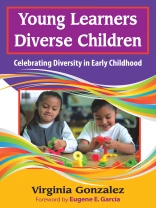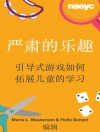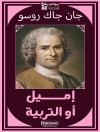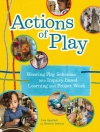‘This is the first resource I have seen on this up-and-coming issue. The book takes a detailed, research-based look at a diverse population of children across the country and can be used effectively by classroom teachers, school divisions, and colleges.’
—Katina Keener, Second-Grade Teacher
T. C. Walker Elementary School, Gloucester, VA
Nurture young children′s self-esteem and boost learning by integrating family culture with instruction!
For the increasing number of diverse young learners, academic and social success can hinge on a teacher′s ability to bridge home and school by making emotional connections with students and their families. This book demonstrates how combining teaching methods with an authentic appreciation of children′s backgrounds builds the confidence they need to succeed.
Young Learners, Diverse Children offers a research-based instructional model that merges cognition, language, and culture to foster a supportive learning environment for diverse and low socioeconomic status (SES) students. Drawing on her direct experience in establishing a successful laboratory school for diverse preschoolers, Virginia Gonzalez presents examples of best teaching practices and provides lesson plans and alternative assessment tools to help readers:
- Improve literacy skills through storytelling that reflects students′ everyday lives
- Collaborate with parents to increase student achievement
- Correlate curriculum with TESOL standards for young children
- Integrate academic standards across developmental levels and content areas
Using this practical handbook, early childhood educators can create richer, more positive learning experiences and help alleviate the real-life challenges of cultural adaptation for newly immigrated or low SES students and their families.
Tabela de Conteúdo
Lists of Figures and Tables
Foreword by Eugene E. Garcia
Preface: A Letter to the Reader
Acknowledgments
About the Author
Part I. Ethnic-Educator Philosophical and Theoretical Framework
1. The Ethnic-Educator Philosophy
Examples of Principle 1
Examples of Principle 2
Examples of Principle 3
Examples of Principle 4
2. The Ethnic-Educator Pedagogical Model
How Teachers′ Personalities Affect Their Assessment and Instructional Decisions
A Socioconstructivistic Pedagogical Model Supporting the Ethnic-Educator Approach
The Four Pedagogical Principles for Learning and Academic Achievement
Part II. Educational Applications of the Ethnic-Educator Approach
3. Teaching Strategies
Strategies Supporting the Ethnic-Educator Approach
First Cluster of Pedagogical Strategies: Thematic Curriculums
First Cluster of Pedagogical Strategies: Holistic Developmental Curriculums
Second Cluster of Pedagogical Strategies: Stimulating Critical-Thinking Skills
Second and Third Clusters of Pedagogical Strategies: A Pluralistic Pedagogy Stimulating Connections to Prior Sociocultural Knowledge and Real-life Experiences
Fourth Cluster of Pedagogical Strategies: An Advocacy Position for Teachers
Suggestions for Applying the Strategies
4. Linking the Teaching Strategies With Academic Content Standards
Linking Assessment to Instruction Through Classroom-Based Observations
Instructional Purposes of Assessment
Integration of Teaching Principles With TESOL Academic Content Standards in the Curriculum
Linking Assessment to Instruction Through Classroom-Based Observations
5. Developmental Tasks for Linking Assessment to Instruction
Case Study Introducing Individual Developmental Tasks
Discussion of Paula′s Overall Performance Across Developmental Tasks
6. Storytelling
Research-Based Knowledge Supporting Storytelling as an Alternative Assessment
Storytelling as an Assessment Method of First- and Second-Language and Cognitive Development
Developmental Stages of Narrative and Semantic Development in Children
Socioconstructivist Perspective for Language Development
Sociocultural Perspective for Language Development
Application of Research-Based Knowledge to Actual Assessment Strategies
Recommended Strategies for Clustering Coding of Responses
Four Recommended Strategies for Interpreting Evaluation Results
Conclusions
7. Alternative Reading Instruction
Introduction
Theoretical Framework Supporting Reading Instruction in Young, Diverse Children
Guided-Reading Approach for Developing Reading-Comprehension Skills
Application of the Guided-Reading Approach
Application of the Schema Theory
Repetition and Practice Make Perfect
Activities for Increasing Reading Abilities
Family Involvement for Increasing Reading Skills
Bridging the Gap Between School and Home Cultures Through Parental Participation
Conclusions
8. Conclusions and Recommendations for Educating Diverse Young Children
Introduction: The BPDC as a Learning Context
Interviews With Teachers Participating in the BPDC Project
Interviews With Diverse and Mainstream Parents Participating in the BPDC Project
Overall Conclusions
Appendix A. Alignment of Philosophical and Pedagogical Principles and Pedagogical Strategies Endorsed by the Ethnic-Educator Approach for Young, Diverse Children
References
Index
Sobre o autor
Virginia Gonzalez has an interdisciplinary professional and academic background (BA in psychology, 1986, from the Catholic University of Lima-Perú; MA in bilingual special education, 1988, and Ph D in educational psychology, 1991, both graduate degrees from The University of Texas at Austin). One of Gonzalez′s major areas of expertise is the development of multidisciplinary models explaining sociocultural and linguistic factors influencing alternative assessment, learning and developmental processes, and instructional programs in bilingual/ English-as-a-second-language (ESL), low socioeconomic status, Hispanic children. Gonzalez has conducted multiple research studies that have been published in the form of books and journal articles, have been disseminated at national/international conferences, and have been applied for the assessment and instruction of diverse learners in the public school setting, and of international ESL students in higher education. These studies have generated alternative models and research methodologies, with important educational applications for the assessment and instruction of ethnic minorities. In light of this scholarly work, Gonzalez has been recognized as an outstanding and prolific scholar by major professional organizations in the interdisciplinary fields of second language learning, bilingual education, and cognitive and language development. Among the many recent recognitions that Gonzalez has received for her scholarly and service work are: she was elected to serve as a member of the Executive Special Interest Group (SIG) Committee, and the Program Committee for the American Educational Research Association (AERA) for a three-year term (2007-2010); she was presented with a Service Award by the AERA Bilingual Education Research SIG in April 2007; she served as a chair and discussant for an Invited Presidential Symposium, entitled ‘Socio-Historical Factors Affecting ESL US Immigrant Public Schools Students′ Academic Achievement, ‘ presented at AERA 2008 Annual Meeting in New York City; and she was selected by the Council for International Exchange of Scholars (CIES) as a recipient for a Fulbright Senior Specialist Grant with the University of Costa Rica, December 2008.












